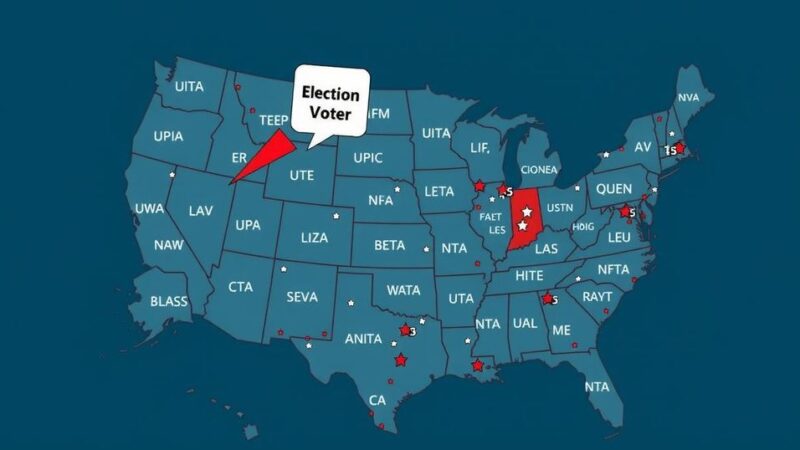Tunisia’s incumbent President Kais Saied is projected to win the presidential election with 89.2 percent of the votes amid a low turnout of 27.7 percent. This victory raises concerns about the legitimacy of the election following a crackdown on opposition candidates. Analysts warn that re-election could further entrench Saied’s authoritarian regime in a country that once symbolized democracy after the Arab Spring.
Incumbent President Kais Saied of Tunisia is projected to achieve a remarkable victory in the recent presidential election, securing approximately 89.2 percent of the votes, according to exit polls released by national media on Sunday. This anticipated triumph, however, comes amidst a notably low voter turnout of just 27.7 percent, raising concerns among rights organizations regarding the democratic legitimacy of his re-election following a severe crackdown on opposition. Saied, aged 66, is expected to decisively defeat his competitors, including imprisoned opponent Ayachi Zammel, who is estimated to garner 6.9 percent of the vote, and Zouhair Maghzaoui with a projected 3.9 percent, as indicated by Sigma Conseil, an independent polling group. Three years after his significant consolidation of power, fears linger that Saied’s election victory will only serve to fortify his authoritarian governance in a nation which once symbolized the aspirations for democracy following the Arab Spring. The Tunisian electoral authority states that there were approximately 9.7 million eligible voters in a population close to 12 million. This voter engagement is markedly lower than the 45 percent turnout recorded in the 2019 election and represents the lowest participation in a presidential election since the revolutionary events of 2011. Political analysts have articulated that the vote has been undermined by the systematic exclusion of alternative candidates, with 14 potential candidates barred from the election due to insufficient endorsements and various other reasons. Hatem Nafti, a political commentator, expressed that the election lacks legitimacy and emphasized the consequences of sidelining notable candidates. In his campaign, Saied has denounced foreign interference and made promises to combat corruption as he advances his agenda for national reconstruction. The final results are anticipated to be officially announced on Monday. The atmosphere surrounding the election is charged. Protesters have labeled Saied a “Pharaoh manipulating the law,” reflecting significant discontent and fear over the country’s political trajectory, particularly following Saied’s drastic measures to alter the constitution and suppress dissent, which has seen over 170 individuals detained on political charges as reported by Human Rights Watch. As Tunisia approaches another chapter in its political history, the implications of this election on the nation’s democratic evolution remain critical.
Tunisia, often regarded as the birthplace of the Arab Spring uprisings, has faced a turbulent political landscape since the ousting of longtime leader Zine El Abidine Ben Ali in 2011. The election of Kais Saied in 2019 marked a significant shift, with concerns growing over his consolidation of power. Following a dramatic power grab in 2021, Saied has been accused of pursuing an authoritarian rule, which has sparked national and international criticism. The context of Saied’s anticipated re-election comes against a backdrop of a low voter turnout, exclusion of opposition, and allegations of rights abuses, raising concerns about the future of Tunisia’s democracy.
Kais Saied’s expected re-election with a staggering majority reflects a pivotal moment for Tunisia, albeit accompanied by deep concerns regarding democratic legitimacy and human rights. The low turnout indicates widespread disenchantment among the populace, and the suppression of dissenting voices casts a shadow over the electoral process. As the nation grapples with issues of governance and civil liberties, the ramifications of Saied’s continued leadership may steer Tunisia further away from its democratic aspirations.
Original Source: www.france24.com






